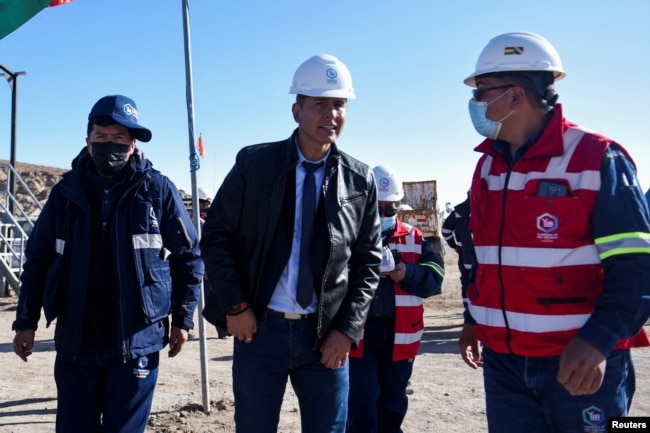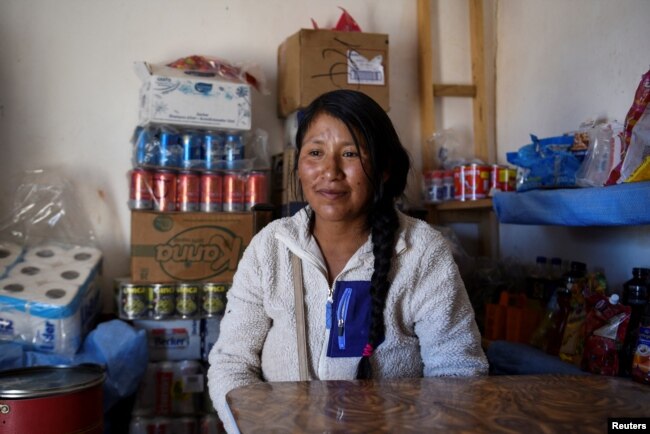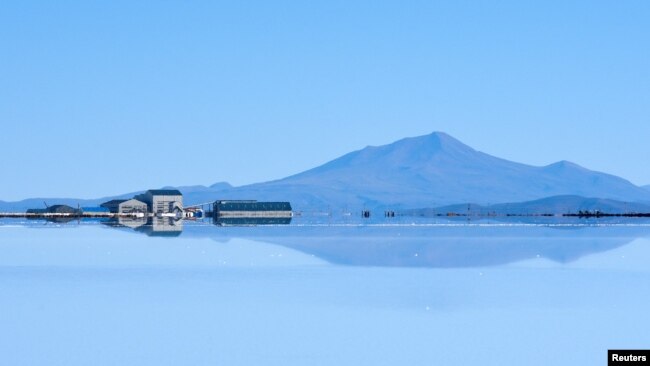リチウム、その需要と供給と思惑
ウユニ塩湖は無事なのでしょうか?
人々は未確定な利権に目がくらんでいるように見えます。
さらには、ボリビアと同盟国である中国、ロシアの手に落ちることが懸念されるだけに目が離せなくなりました!!
Oh!! Bolivia!!
Where are you going?
VOAで今日も楽しく英語を学びましょう!!
ボリビアはリチウム資源を獲得できるのか? (和訳)
Can Bolivia Ever Gain From Its Rich Lithium Resources?
May 25,2022
ボリビア政府は今月、同国で元素リチウムを採掘する権利を売却することを計画してます。政府関係者は、この動きが同国南西部に経済成長をもたらすことを期待しています。
このプロジェクトは、世界市場にリチウムを供給するという、南米の国としてはこれまでで最も野心的なものです。リチウムは電気自動車のバッテリーや電子機器に使用されるため、高い需要があります。
アメリカのテスラやドイツのフォルクスワーゲンは、リチウムの価格が急騰する中、供給源の確保に苦慮しています。
しかし、ボリビアが目標を達成できるかどうかはまだ不明です。
ロイター通信は、同国南西部にある乾燥した湖底のSalar de Uyuniウユニ塩湖周辺で、多くの現・元政府関係者や地元住民に話を聞きました。
これらの人々は、法的な問題、技術的な問題、市民の抵抗など、この大きなプロジェクトにはいくつもの障壁があることを明らかにしました。さらに、ボリビアの与党である社会党内でも、税金やプロジェクトから得られる利益の分配方法について、政治的な意見の相違がありそうです。
ボリビアは今月末に、外国企業との提携を1社以上発表する予定です。中国、ロシア、アルゼンチン、米国から8社の競合他社が資金提供、または入札を行っています。ロイターによると、どの企業もリチウムの商業採掘の経験はないと言います。
南米は高い目標を掲げており、2025年までにリチウムイオン電池を現地で製造することを目指しています。
しかし、ボリビアの隣国チリは、同じ目標を何年も目指していますが、成功していません。しかも、チリの方がはるかに裕福な国です。
フアン・テレス氏は地元知事の顧問です。中央政府の計画から5年遅れで、2030年まで生産は見込めないと彼は言います。
米国の地質調査所では、ボリビアには世界のリチウム資源の約4分の1があると推定しています。しかし、この金属が商業的に回収できるかどうかはまだ不明です。
その過去は過去
ボリビアはこれまで、従来の方法で何億ドルもかけてリチウムを抽出してきましたが、ほとんど成功していません。今回のプロジェクトでは、ルイス・アルセ大統領は、"リチウムの直接抽出 "という別の、しかも未検証の技術を使用する企業との契約を望んでいます。
挑戦する意思のある企業のリストには、米国のLilac Solutions、Breakthrough Energy、EnergyXが含まれています。その他、アルゼンチンのテクペトロール、ロシアのウラニウム・ワン、中国のフュージョン・エナテック、中信国安集団、TBEAなどがあります。
アルセ政権は、ロシアや中国と同盟関係にあります。しかし、米国当局は、米国の2社には公平なチャンスがあると信じていると言います。
アルバロ・アルネス氏はボリビアのエネルギー省の副大臣です。ボリビアエネルギー省の副大臣で、リチウム開発を統括しています。政府が本気であることを示すために、結果を出すことが重要だと彼は話しています。
ウユニ塩湖は、ポトシからそう遠くないところにあります、植民地時代にスペイン帝国の銀生産の中心地でした。現在は与党社会党が強い支持を得ている地域です。しかし、地元関係者は、現大統領が自分たちの承認なしにリチウム生産をコントロールしようとしていると批判しています。
「我々は意見を述べるチャンネルさえ持っていません。 」と顧問のテレズ氏は言い、こう付け加えます。「我々は報道を通じて(決定を)知るのです。」と。
アルネス副大臣によると、ボリビア政府はリチウムの抽出と電池の製造のための事業提携を提案しています。政府は51パーセントを所有し、ベンチャー企業から得られる利益の約半分を得ることになります。
しかし、そのためには、ボリビアは外国企業によるリチウムの採掘を禁止している法律を改正しなければなりません。ボリビア政府は、この事実を利用して、利益の分配を増やすよう交渉したいと考えています。現行法の3%ではなく、15%を要求しています。
Uyuniウユニの町の名は、巨大な乾燥した湖底に由来します。エウセビオ・ロペスさんは、”富の所有者として”、そこに住む人々が最も大きな利益を得るべきだと述べます。
この地域には国営のリチウム採掘工場があり、700人が働いているが、地元出身者はほとんどいません。
「私たちは鉱物を持っています、リチウムを持っています。」とウユニ村のカリーナ・キスペさんは言います、さらにこう付け加えています:「ここの人たちは何かを受け取るべきです。」
フアン・カルロス・モンテネグロ氏は、エボ・モラレス前大統領の下で働いた元政府リチウム採掘担当者です。彼は、人々があまりにも興奮しすぎていると警告しています。「現実に即していない」と付け加えています。
Can Bolivia Ever Gain From Its Rich Lithium Resources?
Bolivia’s government is planning this month to sell rights to mine in the country for the element lithium. Officials hope the move will bring economic growth in the country’s southwest.
The project is the South American country’s most ambitious yet to provide lithium to the world market. The metal is in high demand for use in electric car batteries and electronic devices.
America’s Tesla and Germany’s Volkswagen are struggling to find supplies while lithium prices have sharply increased.
But it remains unclear if Bolivia can meet its goals.
Reuters news agency spoke to many current and former officials and local people around Salar de Uyuni, a dry lake bottom, in the southwestern part of the country.
These people identified a number of barriers to the big project, including legal questions, technological issues and resistance from citizens. In addition, there are likely to be political disagreements within Bolivia’s ruling socialist party over taxes and how to divide profits from the project.
Bolivia expects to announce later this month one or more partnerships with foreign companies. Eight competitors from China, Russia, Argentina and the United States are making financial offers, or bids. Reuters says none of the companies have experience in commercial mining of lithium.
The South American country has set a high goal. It seeks to make lithium-ion batteries locally by 2025.
Bolivia’s neighbor Chile has been seeking the same goal for years without success, however. And it is a far wealthier country.
Juan Tellez is an advisor to the local governor. He said official do not expect any production until 2030 or five years behind the central government’s plan.
The U.S. geological survey estimates that Bolivia has about one fourth of the world’s known lithium resources. But it remains unclear if the metal can be recovered commercially.
That past is the past
Bolivia has spent hundreds of millions of dollars using traditional methods to extract lithium with little success. For this project, President Luis Arce wants contracts with companies that use a different, and untested, technology called “direct lithium extraction.”
The list of companies willing to try includes the U.S. companies Lilac Solutions, Breakthrough Energy and EnergyX. Others include Argentina’s Tecpetrol, Russia’s Uranium One, and China’s Fusion Enertech, CITIC Guoan Group and TBEA.
Arce’s government is allied with Russia and China. But U.S. officials say they believe the two American companies have a fair chance.
Alvaro Arnez is a deputy minister in Bolivia’s energy department. He oversees lithium development. He says it is important for the government to produce results to show that it is serious.
Salar de Uyuni is not too far from Potosí, a colonial center for silver production for the Spanish Empire. Now it is an area where the ruling socialist party has strong support. But local officials criticized the current president for trying to control lithium production without their approval.
"We don't even have a channel to express our opinion," said advisor Tellez, adding: "We are finding out (decisions) through the press."
Deputy minister Arnez said the Bolivian government has proposed creating business partnerships to extract lithium and manufacture batteries. The government would own 51 percent and get about half the profits from the ventures.
To do this, however, Bolivia has to amend its laws which bar foreign companies from extracting lithium. Local government officials want to use this fact to negotiate a greater share of the profits. They want 15 percent instead of the three percent they would get under current law.
The town of Uyuni gives the huge dry lake bottom its name. Eusebio Lopez said that, “as owners of these riches,” the people living there should get the greatest gain from the project.
A state lithium extracting plant in the area employs 700 people, but few come from local communities.
“We have minerals, we have lithium,” said Uyuni villager Karina Quispe, adding: “The people here should receive something.”
Juan Carlos Montenegro is a former government lithium mining official who served under former president Evo Morales. He warned that people are too excited. “It’s not grounded in reality,” he added.
Words in This Story
ambitious –adj. having the desire to be successful, powerful and famous
battery –n. a device that stores electricity to run equipment
commercial –adj. used for business purposes
extract –v. to take a specific substance from a material by use of machines or a chemical process
channel –n. a way of expressing ideas, opinions


